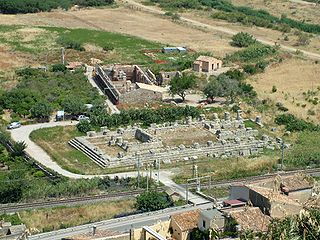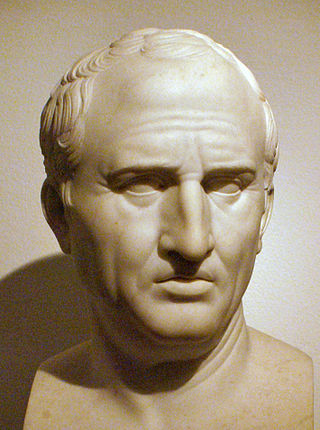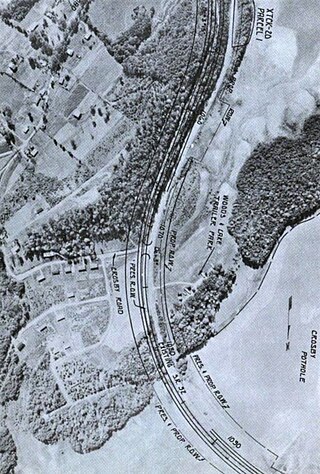
The censor was a magistrate in ancient Rome who was responsible for maintaining the census, supervising public morality, and overseeing certain aspects of the government's finances.

A village green is a common open area within a village or other settlement. Historically, a village green was common grassland with a pond for watering cattle and other stock, often at the edge of a rural settlement, used for gathering cattle to bring them later on to a common land for grazing. Later, planned greens were built into the centres of villages.

In publishing and graphic design, Lorem ipsum is a placeholder text commonly used to demonstrate the visual form of a document or a typeface without relying on meaningful content. Lorem ipsum may be used as a placeholder before the final copy is available. It is also used to temporarily replace text in a process called greeking, which allows designers to consider the form of a webpage or publication, without the meaning of the text influencing the design.

The Laws of the Twelve Tables was the legislation that stood at the foundation of Roman law. Formally promulgated in 449 BC, the Tables consolidated earlier traditions into an enduring set of laws.

Himera, was a large and important ancient Greek city situated on the north coast of Sicily at the mouth of the river of the same name, between Panormus and Cephaloedium in the comune of Termini Imerese.
A castle doctrine, also known as a castle law or a defense of habitation law, is a legal doctrine that designates a person's abode or any legally occupied place as a place in which that person has protections and immunities permitting one, in certain circumstances, to use force to defend oneself against an intruder, free from legal prosecution for the consequences of the force used. The term is most commonly used in the United States, though many other countries invoke comparable principles in their laws.

Uti possidetis is an expression that originated in Roman private law, where it was the name of a procedure about possession of land. Later, by a misleading analogy, it was transferred to international law, where it has had more than one meaning, all concerning sovereign right to territory.
Indirect speech, also known as reported speech, indirect discourse (US), or ōrātiō oblīqua, is the practice, common in all Latin historical writers, of reporting spoken or written words indirectly, using different grammatical forms. Passages of indirect speech can extend from a single phrase to an entire paragraph, and this style was generally preferred by Roman historians to the direct speech commonly found in Greek authors.

Concealed carry, or carrying a concealed weapon (CCW), is the practice of carrying a weapon, either in proximity to or on one's person or in public places in a manner that hides or conceals the weapon's presence from surrounding observers. In the United States, the opposite of concealed carry is called open carry.
An offensive weapon is a tool made, adapted or intended for the purpose of inflicting physical injury upon another person.

Sturges v Bridgman (1879) LR 11 Ch D 852 is a landmark case in nuisance decided by the Court of Appeal of England and Wales. It decides that what constitutes reasonable use of one's property depends on the character of the locality and that it is no defence that the plaintiff "came to the nuisance".

The Indian Telegraph Act, 1885 was the enabling legislation in India which governed the use of wired and wireless telegraphy, telephones, teletype, radio communications and digital data communications. It gives the Government of India exclusive jurisdiction and privileges for establishing, maintaining, operating, licensing and oversight of all forms of wired and wireless communications within Indian territory. It also authorizes government law enforcement agencies to monitor/intercept communications and tap phone lines under conditions defined within the Indian Constitution. The act came into force on 1 October 1885. Since that time, numerous amendments have been passed to update the act to respond to changes in technology.

The political career of Marcus Tullius Cicero began in 76 BC with his election to the office of quaestor, and ended in 43 BC, when he was assassinated upon the orders of Mark Antony. Cicero, a Roman statesman, lawyer, political theorist, philosopher, and Roman constitutionalist, reached the height of Roman power, the Consulship, and played a critical role in the transformation of the Roman Republic into the Roman Empire. A contemporary of Julius Caesar, Cicero is widely considered one of Rome's greatest orators and prose stylists.
Pro Quinctio was a defence speech delivered by Marcus Tullius Cicero in 81 BC, on behalf of Publius Quinctius. It is noteworthy as the earliest of Cicero's published speeches to survive.
Trespass in English law is an area of tort law broadly divided into three groups: trespass to the person, trespass to goods, and trespass to land.
Easements in English law are certain rights in English land law that a person has over another's land. Rights recognised as easements range from very widespread forms of rights of way, most rights to use service conduits such as telecommunications cables, power supply lines, supply pipes and drains, rights to use communal gardens and rights of light to more strained and novel forms. All types are subject to general rules and constraints. As one of the formalities in English law express, express legal easements must be created by deed.
The gens Papia was a plebeian family at ancient Rome. Members of this gens are first mentioned at the time of the Samnite Wars, but do not appear at Rome until the final century of the Republic. Marcus Papius Mutilus was the only member of the family to attain the consulship, which he held in AD 9.
Conditional clauses in Latin are clauses which start with the conjunction sī 'if' or the equivalent. The 'if'-clause in a conditional sentence is known as the protasis, and the consequence is called the apodosis.

In Roman law, the praedial servitude or property easement, or simply servitude (servitutes), consists of a real right the owners of neighboring lands can establish voluntarily, in order that a property called servient lends to other called dominant the permanent advantage of a limited use. As use relations, servitudes are fundamentally solidary and indivisible rights, the latter being what causes the servitude to remain intact despite the fact that any property involved may be divided. Furthermore, there is no possibility of acquisition or partial extinction.

A right of way is a transportation corridor along which people, animals, vehicles, watercraft, or utility lines travel, or the legal status that gives them the right to do so. Rights-of-way in the physical sense include controlled-access highways, railroads, canals, hiking paths, bridle paths for horses, bicycle paths, the routes taken by high-voltage lines, utility tunnels, or simply the paved or unpaved local roads used by different types of traffic. The term highway is often used in legal contexts in the sense of "main way" to mean any public-use road or any public-use road or path. Some are restricted as to mode of use.










